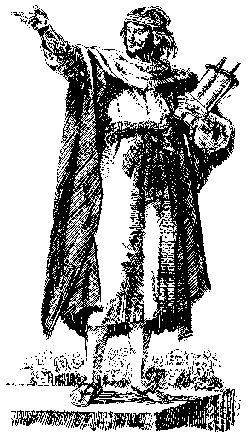| Volume Twenty-Eight — Part 1 Article 7 | Volume 28 | Home |
The Prophets of the Covenant The whole of Israelite religion and history was girded by the knowledge that God, in a historical act, had chosen Israel to be His people and had entered into a covenant with her. The whole of Israelite religion and history was girded by the knowledge that God, in a historical act, had chosen Israel to be His people and had entered into a covenant with her.
The prophets were men of the covenant. They were messengers who were fully aware of the meaning of Israel's election and her covenant responsibilities, but they charged her with failing to live up to the terms of the covenant relationship. Particularly striking was their frequent use of the figure of marital unfaithfulness to describe Israel's course of action (see Ezek. 16; Jer. 2; Hosea 1-3). The prophets found it hard to break through Israel's fatuous conceit, which was nourished by a false view of her election. The covenant was a bilateral agreement, and it could be broken. Israel's glorious destiny could be achieved only if she were obedient. But Israel was unfaithful; she had broken the covenant and forfeited all claims on the divine favor. Therefore judgment and doom would follow. A number of the prophetic books contain a literary form which in recent years has been identified as a covenant lawsuit. Examples of this are found in Isaiah 1:2, 3, Micah 6:1-8 and Jeremiah 2:4-13. On the basis of His covenant with His people God is represented as suing His people before a court of law for breach of contract. In this procedure the witnesses of the covenant —heaven and earth— are duly called. Micah's demand for justice (mishpat), mercy (hesed), and the humble walk with God (Micah 6:8) is based on what is expected of a covenant partner. The prophets are not ecstatic visionaries but lawyers of the covenant with their feet on the ground. They convict Israel of violating the covenant.  One of the most striking features of the prophets is the way in which they pronounce their message of judgment and doom. They frame their oracles of woe in terms echoing the curses associated with the covenant. In Leviticus 26:15, 22 the Lord had warned, "If you reject My statutes. . . and thus break My covenant, then I will send among you wild animals which shall make you bereft of children and destroy your cattle, and make you few in number and your ways desolate." So Jeremiah 8:17 declares: "For behold I will send among you venomous snakes, against which there is no incantation. They shall bite you, without any healing." And Jeremiah 5:6 says, "Therefore a lion from the forest will smite them; a desert wolf shall ravage them. A panther is watching over their cities; everyone who leaves them shall be torn in pieces." One of the most striking features of the prophets is the way in which they pronounce their message of judgment and doom. They frame their oracles of woe in terms echoing the curses associated with the covenant. In Leviticus 26:15, 22 the Lord had warned, "If you reject My statutes. . . and thus break My covenant, then I will send among you wild animals which shall make you bereft of children and destroy your cattle, and make you few in number and your ways desolate." So Jeremiah 8:17 declares: "For behold I will send among you venomous snakes, against which there is no incantation. They shall bite you, without any healing." And Jeremiah 5:6 says, "Therefore a lion from the forest will smite them; a desert wolf shall ravage them. A panther is watching over their cities; everyone who leaves them shall be torn in pieces."Deuteronomy 28:53-57 mentions among the curses the awful doom of people eating their own children. Ezekiel 5:10 pronounces this curse on Israel (see also Hosea 13:7, 8). Delbert Hillers is able to point out many instances where international treaties contain curses which bear a remarkable similarity to the curses pronounced on Israel by the prophets.
The prophet intercedes with God on the basis of His covenant faithfulness. God's righteousness means that He will forgive and renew His covenant with those who repent (Dan. 9:15-19). It was in this context that God promised to send the Messiah to take away sin and confirm His covenant. Daniel, of course, was praying for the restoration of the Jews from captivity and a renewal of the covenant after the Exile. Such a renewal did take place under Ezra and Nehemiah (see Neh. 9 & 10), but God knew that it would be no more stable than before, because it was based on a hesed no more stable than a morning cloud. So in answering Daniel's prayer for forgiveness and restoration (i.e., a renewal of the covenant), God said that He would send His Messiah to make the covenant permanent (see Dan. 9:24~27).1 ———————————————— 1 The whole context of Daniel 9 is about the covenant between God and His people. Daniel prays for the renewal of the covenant which Israel has broken. The covenant of Daniel 9:27 is the covenant" — the one that the whole record of salvation-history is about. It is the Messiah who confirms that covenant, for He is the Prince (Dan. 8:25:11:22) and the Messenger of the covenant (Mal. 3:1; see also Isa. 42:6). The idea of injecting a supposed covenant of antichrist into Daniel 9:27 is an importation which has nothing to do with the context. |